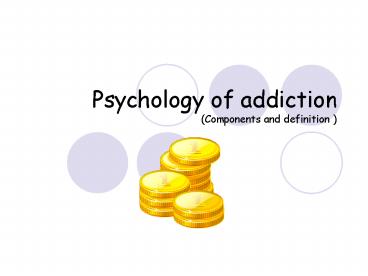Psychology of addiction (Components and definition ) - PowerPoint PPT Presentation
1 / 20
Title:
Psychology of addiction (Components and definition )
Description:
Famous Addicts Courtney Love Charlie Sheen Britney Spears Lindsay Lohan Whitney Houston Samuel L Jackson Demi Moore Mike Tyson Amy Winehouse Activity 1 ... – PowerPoint PPT presentation
Number of Views:1655
Avg rating:3.0/5.0
Title: Psychology of addiction (Components and definition )
1
Psychology of addiction(Components and
definition )
2
Addiction
Are addicts born or made?
Who is most likely to become addicted?
When you hear the word addiction, what pops
into your head?
What type of activities do you associate with
addiction?
3
Addiction in the press.
- Our Addiction to Tiger Woods' Sex Addiction
- Amy in rehab for heroin
- Corey Haims death underlines dangers of
prescription drugs
4
L/objectives
- All Identify models of prevention of addictive
behaviour. (Grade E) - Most describe explain models of addictive
behaviour. (Grade C/D) - Some Critically compare the explanations of
addictive behaviour. (Grade B)
All must include theories of reasoned action
planned behaviour.
5
Famous Addicts
- Courtney Love
- Charlie Sheen
- Britney Spears
- Lindsay Lohan
- Whitney Houston
- Samuel L Jackson
- Demi Moore
- Mike Tyson
- Amy Winehouse
6
Activity 1.over to you.
- Devise your own definition of addiction.
- Pair yourself with another student share your
defintion,discussing the problems with defining
it. - Post-Discussion
- Was it easy?
- What boundaries were you working within?
- Do your definitions cover all addictions? If not
why?
7
Your answers will depend upon..
- Do you believe addiction is inherent or learned?
- In reality you could argue the case for both or
sit on the fence (we like the view here!)
Nature or Nurture. A good time to consider this
angle!
8
Definition of addiction.
- Addiction is the compulsive uncontrolled use of
habit forming drugs - (Websters New International Dictionary)
- Addiction is a state of periodic or chronic
intoxication produced by repeated consumption of
drug, natural or synthetic - (World Health Organisation)
- http//www.youtube.com/watch?vzgCprJPSlpA
- Still not convinced watch this clip!!
9
Definition of addiction cont.
- There is a growing feeling that the definitions
need to encompass addictions that do not
necessarily require the user to ingest a substance
Can you think of someto start you off I have
one Gambling. Your turn!!!!
10
Marlatt et al (1998) suggests
- "Addictive behaviour is a repetitive habit
pattern that increases the risk of disease and/or
associated personal and social problems....often
experienced subjectively as 'loss of
control'....these habit patterns are typically
characterized by immediate gratification (short
term reward), often coupled with delayed,
deleterious effects (long term costs)....attempts
to change an addictive behaviour (via treatment
or by self-initiation) are typically marked by
high relapse rates" - (Marlatt, Baer, Donovan Kivlahan, 1988)
11
So what are the components of addiction?
- There are elements that sum up in the clinical
sense a diagnostic criteria for addiction. You
have to ensure there is a distinction between
very enthusiastic vs. addicted.
I really want chocolate...but I can live
without.
I really want chocolate...I need it oh my god I
cant cope without it.
This takes away from life
This adds to life.
12
Components of addiction.
- Salience
- Mood modification
- Tolerance
- Withdrawal
- Conflict
- Relapse
13
Salience -An extract from Tony.
- If I wasn't actually gambling I was spending the
rest of my time working out clever little schemes
to obtain money to feed my habit. These two
activities literally took up all my time - This indicates total preoccupation. Reverse
salience is when the addictive behaviour becomes
the most important thing in the persons life.
14
Mood modification.
- What a rush
- I was buzzing
- It makes me feel relaxed
- Addicts bring about mood changes. Relaxation,
escapism are some of the words used to describe
the feeling from engaging in the addictive
behaviour.
15
Tolerance-e.g.. heroin, The need to increase a
fix to get the high they used to get.
- That feels great
- Thats not enough anymore
- That feels better
After a while
Now I need X2 to feel Good.
16
Withdrawl Symptoms
- Can include shakes, irritability, moodiness
nausea. - These are not uncommon when use of a particular
stimulant (not necessarily ingested-could be
refraining from a said behaviour) - It is believed they are a result of chemical
changes.but what if you have not ingested
anything and get these side effects? - Could it be the refraining from the behaviour
itself causing the symptoms?
17
Conflict
- Addicts often have a great deal of conflict with
others around them, causing misery. - The conflict is sometimes within themselves too.
- Continuing to use the said behaviour relieves the
conflict, it is used as a sort of coping
strategy.
18
Relapse-repeating earlier patterns.
- Classic examples smokers, they give up for a
said amount of time then they relapse - Griffiths (2002) suggested relapses are common in
all addictions, including behavioural addictions
such as gambling.
19
Task 2 Over to you again..
- Overeating
- video gaming
- love
- using the internet
- exercise
- Choose one of these titles.
- How well does it apply to the components of
addictive behaviour (give examples) - What difficulties can you identify.
20
Models of addictive behaviour.
- The disease model- Addiction comes from a
disorder of the body. - The genetic model-Genetic predisposition towards
addictive behaviour. - The experiential model- Behaviours are temporary
dependent on situation - The moral model Lack of character, result of a
weak individual.































